President Trump is shooting himself in the foot with ill-advised Twitter attacks like the one he did this week on Amazon.
The Washington Post, which is owned by Amazon CEO Jeff Bezos, reported earlier this week that a number of Trump's golf properties were displaying a fake issue of Time magazine with Trump on the cover. Trump proceeded to attack Amazon and the Washington Post in a tweet accusing the "fake news" paper for protecting Amazon for not collecting sales taxes from online purchases:
TRUMP TWEET: "The #AmazonWashingtonPost, sometimes referred to as the guardian of Amazon not paying internet taxes (which they should) is FAKE NEWS!"
This attack was ill-advised for a number of reasons.
For one thing, the underlying accusation is unfounded. If Trump were more up on the real news he would have known that Amazon started collecting sales taxes nationwide as of April 1, and even before April 1, Amazon collected sales taxes in most states.
Trump diminishes his credibility a little more each time he launches an unfounded accusation. He would do well to the words of Albert Einstein: "Whoever is careless with the truth in small matters cannot be trusted with important matters."
He would also do well to consider George Will's observation, in a "Meet the Press" appearance in March, that Trump's lack of credibility, undermining of the intelligence community, and constant labeling of various reputable news organizations as "fake news," will become a serious problem when the country has to take bold action in the face of a threat from North Korea or elsewhere and the threats and the president need to be believed.
The president is setting himself up to be "the boy who [tweeted] wolf," and that will be a problem when wolves appear.





